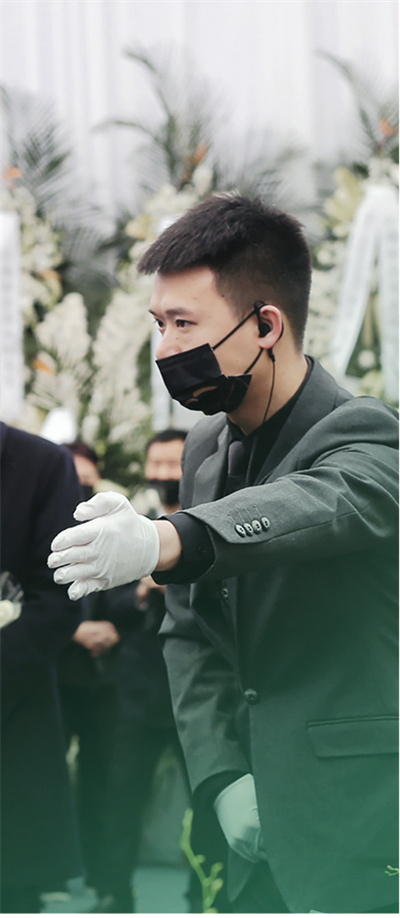Young professionals in the funeral industry are blending tradition with innovation, offering personalized and meaningful services that honor life and reshape societal views on death.

At just 28 years old, Wan Changyou has already worked in the funeral industry for six years.
After earning a degree in modern funeral management in 2019, Wan began his career at a funeral home in Shandong before joining B.D.R, a Shanghai-based funeral service company, in 2022.
As a funeral ritualist, Wan has assisted over 500 families. His work includes preparing symbolic daily necessities for the deceased's afterlife and conducting the funeral rites.
While Wan's career path may seem straightforward, given his academic background, his colleague Shen Jiaying took a more unexpected route into the industry.
Also 28, Shen has a degree in animation and previously worked in the ACGN (animation, comics, games, and novels) sector. However, after attending a relative's funeral that felt "hollow" and "lacked genuine meaning", she decided to switch careers.
"That experience inspired me to explore the industry myself," she said.
ALSO READ: Chinese mourners turn to AI avatars to reconnect with departed
Shen joined B.D.R in 2021 and now works in the new media department, where she helps introduce the funeral industry to the public through videos and articles on social media.
In recent years, more young people like Wan and Shen have been entering the field.
Li Qi, head of the teaching and research sector of modern funeral management program at Wuhan Social Work Polytechnic (WSWP) in Hubei province, said the program receives 300 to 400 applicants annually, despite offering only 150 spots.
"Last year, the employment rate for these graduates was over 95 percent," she said.
READ MORE: World's smallest escape room is a coffin
Chen Gang, a 29-year-old funeral planner from Chongqing, has also observed that while older professionals often emphasize tradition, his generation is more focused on personalizing services to reflect the deceased's personality, preferences, and life story — while still respecting traditional rituals and family wishes.
For example, Chen once arranged a birthday cake and decorations for a funeral that coincided with the deceased's birthday.
"Young people are often distanced from the concept of death, which makes them more open to discussing and imagining it — leading to innovation within the industry," Shen said.

Behind the stereotypes
Despite growing interest, the funeral industry is still often misunderstood. A common stereotype is that funeral workers are "overpaid for easy work", a misconception Li challenges by pointing out that the average salary in Hubei ranges from 3,000 to 5,000 yuan ($411.68 to $687.73).
"Our work requires us to be on call 24/7," Shen noted, emphasizing the demanding nature of the job. She recalled receiving a call from a family at 2 am while she was asleep but immediately responded with professional guidance.
Chen explained that some irregular practices within the industry may contribute to misconceptions about high earnings. For example, unlicensed funeral service companies may charge families high fees without providing proper service guarantees. Many people, unaware of how to find legitimate providers, often fall into these traps during difficult times.
READ MORE: AI 'resurrection' of dead stars raises ethical, legal concerns
"Every city has an official funeral hotline, but many families don't know about it," Chen explained.
Since 2022, Chen and his colleagues have been posting videos on social media platforms like Douyin (the Chinese version of TikTok) to introduce the funeral industry and address widespread misunderstandings.
On these platforms, Chen has noticed that some internet users hold other prejudices, such as associating the industry with bad luck. Some of his videos have even been taken down due to user complaints.
"However, I've seen a significant increase in public awareness of the funeral industry," Chen said, reflecting on the changes since he joined the field in 2017. "This shift is largely thanks to the efforts of online influencers and the way the industry has been portrayed in films and TV shows in recent years."

Honoring with innovation
Zhu Xinye, an 18-year-old freshman at WSWP, developed an interest in modern funeral management after watching videos on Douyin.
"Respect for life is the core value of this industry," she said.
Zhu hopes that modern technology can bring a more human touch to funeral services.
"If AI could recreate the appearance and voice of the deceased, allowing them to say goodbye to their family, it could be a great comfort," she explained.
This vision is already taking shape. Shen shared that they used AI to simulate the voice of a 16-year-old boy, enabling him to "say" goodbye to his family at his funeral.
READ MORE: Tranquility of death inspires tale of empathy
Shen also recalled a special memorial for a civilian hero — an elderly man who had suffered severe burns while rescuing others from a fire in his youth. Although he had recovered, his appearance was permanently altered.
For his memorial, Shen's team created a life-size hologram of the man as he had looked in his youth — handsome and whole.
"The man's daughter stood before the hologram, reaching out to touch her father's image," Shen remembered. "Even a small innovation like this holds great significance."
Beyond death's end
In addition to its funeral services, B.D.R has opened Shanghai's first "life cafe", designed as a comforting space for the families it serves.
Many families visit the cafe to remember their lost loved ones and share stories, extending the course of life through these memories.
The cafe has also attracted a diverse range of visitors. Shen mentioned that guests include children as young as 8, who come with their parents to learn about death, as well as a 70-year-old woman who traveled from Changsha in Hunan province just to engage in conversation.
"With the consent of families and guests, we created a card game inspired by their real-life stories," Shen said.
The game simulates real-life scenarios, where players draw random events and make choices that lead to different life paths. This year, the cafe is working on a youth version of the game in collaboration with universities and schools to incorporate it into death education programs.
"I once thought death would erase all meaning, but every time I witness the tears, regrets, and emotions of the deceased's family, I feel the true weight of life," Shen said.


